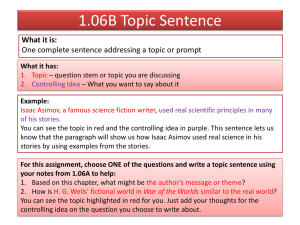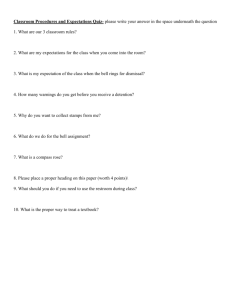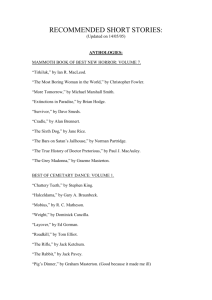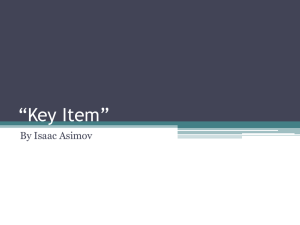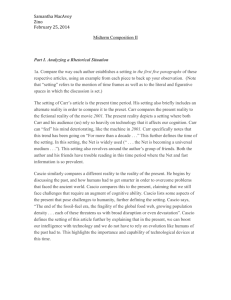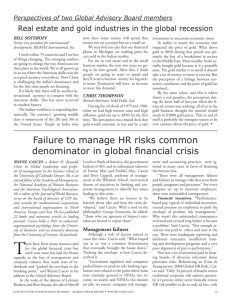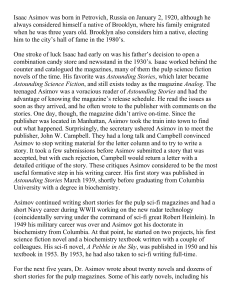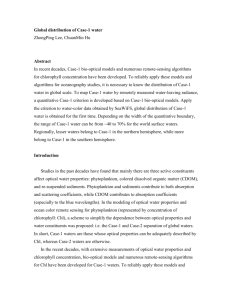Unit 2 Final
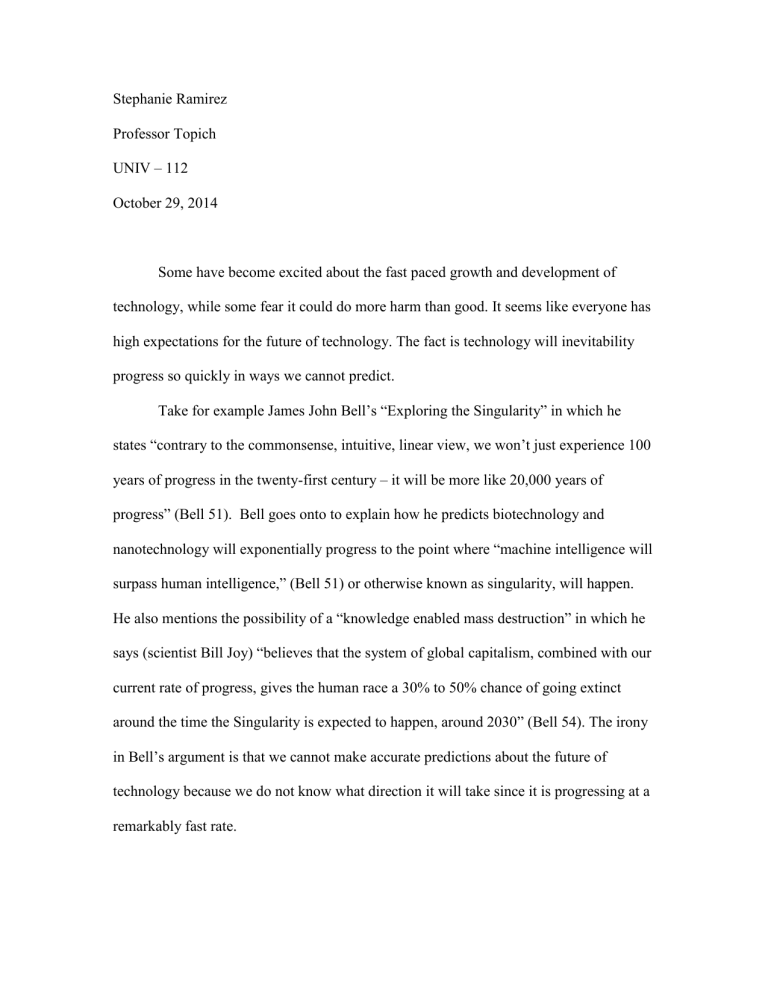
Stephanie Ramirez
Professor Topich
UNIV – 112
October 29, 2014
Some have become excited about the fast paced growth and development of technology, while some fear it could do more harm than good. It seems like everyone has high expectations for the future of technology. The fact is technology will inevitability progress so quickly in ways we cannot predict.
Take for example James John Bell’s “Exploring the Singularity” in which he states “contrary to the commonsense, intuitive, linear view, we won’t just experience 100 years of progress in the twenty-first century – it will be more like 20,000 years of progress” (Bell 51). Bell goes onto to explain how he predicts biotechnology and nanotechnology will exponentially progress to the point where “machine intelligence will surpass human intelligence,” (Bell 51) or otherwise known as singularity, will happen.
He also mentions the possibility of a “knowledge enabled mass destruction” in which he says (scientist Bill Joy) “believes that the system of global capitalism, combined with our current rate of progress, gives the human race a 30% to 50% chance of going extinct around the time the Singularity is expected to happen, around 2030” (Bell 54). The irony in Bell’s argument is that we cannot make accurate predictions about the future of technology because we do not know what direction it will take since it is progressing at a remarkably fast rate.
We also see this sort of fast progression of technology in Isaac Asimov’s “The
Last Question,” where civilization has found a solution to almost every one of it’s problems they have encountered with advancements in technology. The characters in
Asimov’s “The Last Question” spend trillions of years worrying about the one question technology cannot answer, that is can entropy or “the amount running down of the universe” (Asimov 5) be reversed. Even though technology in their civilization rapidly is progressing, the machine that was created to be more intelligent than humans, can’t always predict where it’s headed next, stating variations of “INSUFICIENT DATA FOR
MEANINGFUL ANSWER” (Asimov 6) when asked. This is just another example of people trying to predict the uncertain future of technological advances.
Author of “Is Google making us Stupid?” Nicholas Carr warns his readers about technology improving, while it’s making us lazy and unable to focus. He believes that people today are too dependent on technology and that it is physically affecting us and changing society. Before if someone had wanted to acquire knowledge on something, they would most likely go to the library and read a book on the subject, now if you wanted to learn about something you would most likely do a Google search and get answers in seconds. This is why Carr argues that Google is doing the work for the brain, comparing it to artificial intelligence. However he is not first to fear technological advancement. He brings up Greek philosopher Socrates’s fear of unpredictable advancement saying that “he feared that, as people came to rely on the written word as a substitute for the knowledge they used to carry inside their heads, they would in the words of the dialogue’s characters, “cease to exercise their memory and be forgetful”
(Carr 106). This is an example of people fearing what is uncertain to them at the moment.
Jamais Cascio’s “Get Smarter” paints a more optimistic picture of the future of technology in response to Carr’s “Is Google making us Stupid?” He reflects on the positives saying that we got to where we are today by getting smarter and using resources such as technology to propel us forward. He states “but here’s an optimistic scenario for you: if the next several decades are as bad as some of us fear they could be, we could respond, and survive, the way our species has done time and again: by getting smarter”
(Cascio 108). Although unpredictable, this may be plausible, seeing that characters in
Asimov’s “The Last Question” did just that. He argues that we should not worry at all about advancements in technology because we will somehow manage to use it to our advantage (Cascio 110). Cascio goes on to say “for someone going from 2009 to 2030 day by day, most of these changes wouldn’t be jarring; instead, they’d be incremental almost over determined, and the occasional surprises would quickly blend into inevitability” (Cascio 114).
In Arthur C. Clark’s “Nine Billion Names of God,” monks use a computer to print out every possible name for God, something they have trying to complete for centuries in just a few months, thus achieving God’s purpose. The engineers sent to look over the computer were wary of the monks’ prophecy and sabotage the computer so it will finish doing it’s job by the time their transportation arrives. The engineers seem to undermine the computer’s ability however. Their plan goes according to plan but they did not expect the world to end. They were supposed to be the technology experts and knew what the computer could and couldn’t do, but they did not predict this outcome. Perhaps there
would have been different outcome if they knew that would happen, as one states, “the very idea is something like blasphemy” (Clark 4).
In Ray Bradbury’s “The Veldt” a family lives in a home that does everything for them including provide entertainment for their technology savvy children who use this to kill their parents after threatening to turn off the home. The parents George and Lydia
Hadley are shocked at their children’s ability to manipulate technology when they discover that they turn the nursery into a virtual African jungle on and off at their pleasure. The father, George only predicts the consequences when the children have become skilled at doing this. However there is no way he could have predicted this outcome when he first purchased the home system, simply because we cannot exactly how people will use technology in the future. Ray Bradbury himself also had high expectations for the future, setting the story in the “not too distant future” perhaps and including the concept of the not-so-virtual-reality that the family depended upon.
Miguel de Unumuno recounts the tale of a traveler who ends up alone in a city run by machines in “Mechanopolis.” We know people once lived in Mechanopolis because of the artifacts and structures left behind and their local newspaper writes about him saying
“as we predicted, the poor man-who we do not know how-turned up in this incomparable city of Mechanopolis is going insane. His spirit filled with ancestral worries and superstitions regarding the invisible world, cannot adapt itself to the spectacle of progress. We feel deeply sorry for him” (Unamuno 50-51). The question here is, did the former residents of Mechanopolis predict the downfall of their city and leave? Or were they unable to predict the power of technology and were wiped out because of this?
A common theme all of the following stories and articles have is the ever-growing advancement of technology and it’s unpredictability. Several of the authors ironically try to make specific predictions about the future of technology themselves, but as we have seen it in the past, only time will tell.
Works Cited
Asimov, Isaac. “The Last Question.” Blackboard.vcu.edu, 1956. PDF file.
Bell, James John. “Exploring the Singularity.” Focused Inquiry Evolving Ideas.
Plymouth: Hayden-McNeil, 2014. 51-58.Print.
Bradbury, Ray. “The Veldt.” Focused Inquiry Evolving Ideas. Plymouth: Hayden-
McNeil, 2014. 82-94.Print.
Carr, Nicholas. “Is Google making us Stupid?” Focused Inquiry Evolving Ideas.
Plymouth: Hayden-McNeil, 2014. 101-107. Print.
Cascio, Jamais. “Get Smarter.” Focused Inquiry Evolving Ideas. Plymouth: Hayden-
McNeil, 2014. 108-115. Print.
Clark, Arthur C. “Nine Billion Names of God.” Blackboard.vcu.edu, 1953. PDF file.
Unamuno, Miguel de. “Mechanopolis.” Blackboard.vcu.edu, 1913. PDF file.
